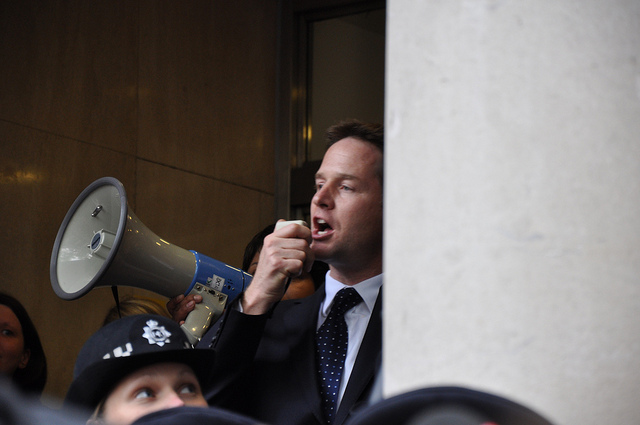The electoral prospects of the Liberal Democrats rest on local parties and incumbency
There is a strong consensus that the Liberal Democrats will suffer badly at the next General Election, with the consequences of five years of coalition and changes of policy tack coming back to haunt them. But while they will undoubtedly come under pressure to hold on to all, or even most, of their MPs, wipeout is far from inevitable, with the party continuing to benefit from incumbency and strong local organisations. It is in these that the party’s hopes should reside for 2015, argues Craig Johnson.
It would appear a somewhat common assumption, both within the mainstream media and within the academic community, that the Liberal Democrats will perform badly at the next general election. Small coalition parties tend to struggle more than most to maintain or improve their vote and seat shares, and the party’s national polling figures, averaging between 7 and 10 per cent since the end of 2010, represent a large fall from the 23 per cent that the party polled at the last general election. Losing over 1,000 councillors across Britain since 2010 has simply hammered home the ‘Lib Dem collapse’ argument even further.
However in my article, published in Politics, I argue that such analysis does not take into account the ability of the Liberal Democrats to win and maintain parliamentary seats in their strongest geographical areas. Research has consistently shown that strong local campaigning is rewarded by the electorate, and has been utilised to good effect by the Liberal Democrats since their inception. By winning locally in their strongest areas, the Liberal Democrats have bolstered their resources and used local activism and structured organisation to help maintain and strengthen their national representation.
The most effective way for the party to establish long-term credibility has been to develop success at local government level, hoping to be judged on their performance in that specific context before advancing further. This should not be considered a surprising method. Local parties serve many functions in representative democracies, not least providing the benefits of campaigning and membership to national parties. National parties also value their local associations as they provide them with legitimacy in the eyes of the public. For ‘ordinary citizens’, local parties provide easy means of entering the political process through activism. Such voluntary labour is vital, as local parties become able to translate the abstract national agenda into the relevant local one, and encourage further participation throughout the party’s organisational structure.
Electorally, the Liberal Democrats have found it much easier to win local authority seats, and subsequently take control of local authorities, than they have parliamentary seats. As local authority wards are smaller than parliamentary constituencies, limited resources can be targeted more directly. Instead of general campaigns about Liberal Democrat policy, particular strategies can be employed in local areas, reinforced by concentrated campaigning by activists. Most Liberal Democrat leaflets contain a chart to indicate the success of the party in recent elections, aiming to show that a vote for the party is not a wasted one. Local election success also builds up a greater body of activism for the Liberal Democrats, and institutes a wider ethos of continued campaigning that strengthens the party year on year.
However, post-2010 the Liberal Democrats have failed to maintain their local electoral base. Heavy losses in local elections are not uncommon for incumbent parties. Labour’s local electoral base declined throughout its 13 years in government, yet they still maintained national success. Such recent precedent is not available for junior coalition parties within British politics. The Liberal Democrats have focused on building a local electoral base that forms a significant aspect of their organisational structure. Losing over 1,000 councillors post-2010 across Britain has not only damaged the electoral reputation of the Liberal Democrats, but also represents a major setback for the party and its organisational structure.
It is such results, along with lower national polling figures, that have led some to suggest that the Liberal Democrats will lose a substantial number of seats at the next general election. If their seat share is to collapse so badly, two more expectations should be realised:
- They should be losing support in their strongest areas and in those constituencies where they have incumbent MP: Data collected by Lord Ashcroft suggests that the Liberal Democrats are actually polling relatively well in marginal seats, and as Mark Bennister has pointed out recently on the PSA blog, ‘the mid-term by-election win in Eastleigh demonstrated that the Lib Dems do well when they have concentrated resources’. This echoes thoughts by Lewis Baston, who points out the troublesome nature of trying to translate Liberal Democrat votes into seats.
- Since their local parties are a necessary platform for national success, the Liberal Democrats’ strongest local associations should be crumbling: This can be examined by analysing financial data reported to the Electoral Commission (any local association earning or spending more than £25,000 in any given year must report their financial accounts). The data shows mixed results for the Liberal Democrats post-2010. The broad strength of the Liberal Democrats’ local associations appears weaker. Fewer associations are earning the £25,000 necessary to report their data to the Electoral Commission post-2010 compared with post-2005. However, in their strongest areas, on average, the Liberal Democrats are earning and spending more post-2010 than post-2005. Perhaps most importantly, those Liberal Democrat constituency parties with incumbent Liberal Democrat MPs appear to be financially stronger post-2010 than post-2005. Whilst membership data is available, it is patchy and not conclusive.
Maintaining and strengthening their position in associations with incumbent MPs is perhaps the best chance the party has to return an electorally relevant share of seats at the next general election. This is not to say that the Liberal Democrats will retain all or nearly all 57 seats from their 2010 intake. Indeed, they are clearly under considerable pressure. However, ahead of the next general election, if they are able to maintain their local party organisation in their strongest constituencies, then the predicted Liberal Democrat collapse may be somewhat mitigated.
—
Note: this post represents the views of the author and not those of Democratic Audit or the LSE. It originally appeared on the PSA blog and has been re-posted with permission. Please read our comments policy before posting. The shortened URL for this post is: https://buff.ly/1muD1K9
—
 Craig Johnson is a PhD student in Politics at Newcastle University. The full results and his analysis of Liberal Democrat associations is available to read in Politics (open access). He tweets at@cjnu1 and blogs here.
Craig Johnson is a PhD student in Politics at Newcastle University. The full results and his analysis of Liberal Democrat associations is available to read in Politics (open access). He tweets at@cjnu1 and blogs here.






 Democratic Audit's core funding is provided by the Joseph Rowntree Charitable Trust. Additional funding is provided by the London School of Economics.
Democratic Audit's core funding is provided by the Joseph Rowntree Charitable Trust. Additional funding is provided by the London School of Economics.
gucci bags
https://www.pradahandbagsoutlet2013.com prada outlet The electoral prospects of the Liberal Democrats rest on local parties and incumbency : Democratic Audit UK
nike outlet
https://www.bfaero.com/samantha-thavasa-jp02.html https://www.bfaero.com/samantha-thavasa-jp02.html The electoral prospects of the Liberal Democrats rest on local parties and incumbency : Democratic Audit UK
salvatore ferragamo
https://www.sylmad.org/gucci-jp02.html グッチ The electoral prospects of the Liberal Democrats rest on local parties and incumbency : Democratic Audit UK
サマンサタバサ 長財布
https://www.saclancelpascherfra.com sac lancel The electoral prospects of the Liberal Democrats rest on local parties and incumbency : Democratic Audit UK
louis vuitton outlet
https://www.louisvuittonoutletbagsvip.com louis vuitton outlet The electoral prospects of the Liberal Democrats rest on local parties and incumbency : Democratic Audit UK
サマンサタバサ 財布
https://www.salvatoreferragamooutletsale.com salvatore ferragamo The electoral prospects of the Liberal Democrats rest on local parties and incumbency : Democratic Audit UK
sac lancel pas cher
https://www.4wargamers.com/samantha-thavasa-jp03.html サマンサタバサ 長財布 The electoral prospects of the Liberal Democrats rest on local parties and incumbency : Democratic Audit UK
camisetas de futbol 2014
Ita??s truly a good and valuable piece of information.Ia??m glad that you shared this useful details with us.Remember to keep us educated like this.Thanks for sharing
.@UniofNewcastle’s @cjnu1on the @LibDems electoral prospects https://t.co/4pTuUxPqqU
The electoral prospects of the Liberal Democrats rest on local parties and incumbency https://t.co/3W3eTyDyjG
Good post @cjnu1 MT @democraticaudit electoral prospects of… Liberal Democrats rest on local parties and incumbency https://t.co/xz1Wzl7w0W
The electoral prospects of the Liberal Democrats rest on local parties and incumbency https://t.co/TIg3ALdazP
“@democraticaudit: electoral prospects of the LDs rest on local parties & incumbency https://t.co/kIB5BFB6tG”
Grassroots organization matters